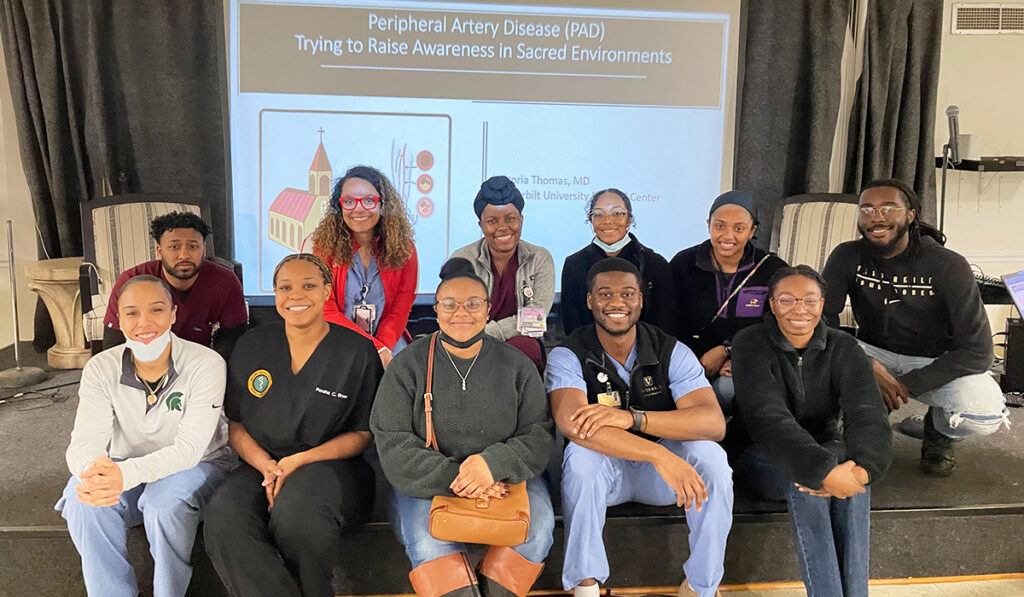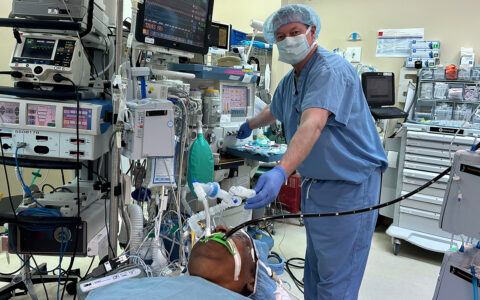Peripheral artery disease (PAD) often progresses in silence – until it’s too late.
Without a diagnosis or treatment, older Americans from all walks of life suddenly find themselves facing consequences from mild pain to limb loss from a disease that impacts 200 million people worldwide.
Victoria Thomas, M.D., an interventional cardiovascular medicine fellow at Vanderbilt University Medical Center, has made it a priority to ensure that care is extended to individuals most-at-risk of developing the disease, including Black Americans, who have some of the highest rates. One aspect of her efforts is to find more effective ways of delivering health information to prospective patients.
“The goal is to further push health equity.”
“One of my mentors told me, ‘Stop asking them to come downtown, go to them, go to their communities,” she said.
In response, Thomas launched a community-based program known as PAD Raising Awareness in Sacred Environments (PRAISE) that takes the message to church – intentionally reaching out to congregations with higher risk factors for the disease.
Praise for PRAISE
“Dr. Thomas seeks to investigate an incredibly important question about the understanding of PAD in a population at risk in a novel venue – places of worship,” said Thomas’ mentor, Joshua Beckman, M.D., a professor of medicine now at UT Southwestern, who studies mechanisms of PAD.
PRAISE began in 2022, when Thomas received a research fellowship from combined resources at the American College of Cardiology, the Association of Black Cardiologists, and Merck.
PRAISE events kicked off in January 2023 in churches in and around Nashville, with primarily Vanderbilt and Meharry medical students active in the outreach. Participants completed a pre-assessment that included their familiarity with PAD and then a reassessment after a presentation given by Thomas, who outlined its risks, symptoms, diagnosis and treatment. Participants also underwent ankle-brachial index screenings to detect for PAD.
“Her work may help to improve both the community understanding of this disease process and the communication with the medical community,” Beckman said.
Pointed Prevention
A progressive disease in which atherosclerosis causes artery stenosis in the lower extremities, rates of PAD are highest among Black Americans as compared to other racial groups. Combined with longstanding health care access issues, Black Americans are also more likely to suffer worse outcomes of the disease, including amputation.
A major goal of the program is to reach populations most at risk of developing PAD before symptoms become severe. Through PRAISE, Thomas and colleagues can identify the earliest signs in populations who might otherwise not receive such pointed preventative care.
“Black Americans and women have a lower likelihood of having the diagnosis of PAD made prior to a hospital presentation,” Thomas said. “Through PRAISE, we partner with churches to increase the overall knowledge of PAD, increase the diagnosis of previously undiagnosed PAD, and provide avenues to decrease the health disparity by bringing awareness to women and Black Americans in a novel way.”
The first year of the PRAISE program concluded during the summer. Thomas says initial results found that more than 10 percent of patients screened for PAD at churches indeed had the disease, and more than 90 percent of those participants were newly diagnosed.
“The PRAISE study demonstrates that an effective community partnership with churches increases PAD familiarity and allows for early detection of PAD, specifically among populations that are historically at higher risk for PAD complications,” Thomas said.
First Steps
PRAISE is just the beginning for Thomas’s work in this area.
“Long-term, I want to organize and conduct a community-based clinical trial,” said Thomas, who is also pursuing a Master of Science in Clinical Investigation degree at Vanderbilt to further support her role as a physician-scientist.
A future trial could investigate how PRAISE or other community-based interventions might improve cardiovascular health outcomes for Black Americans, she says.
“The goal is to further push health equity,” said Thomas, who is adamant that community-based initiatives can be vital pathways.




